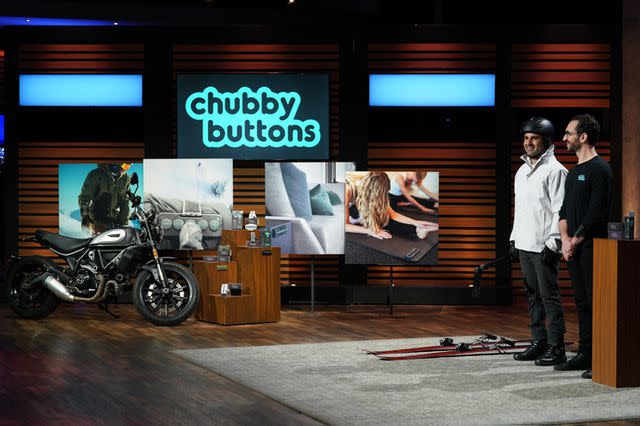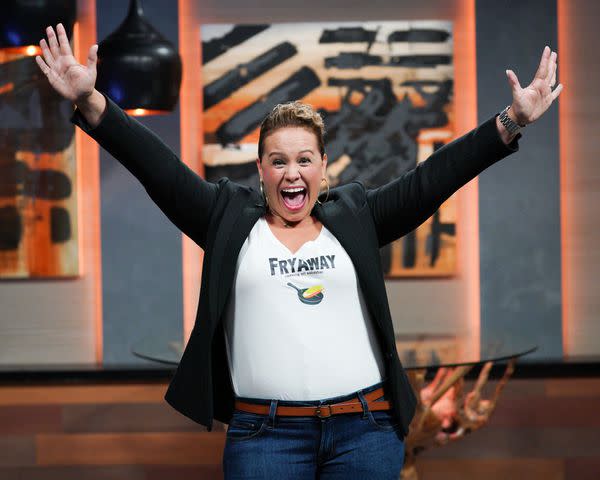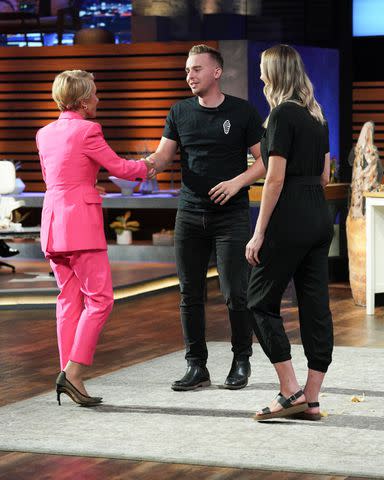Unique Rules You Didn’t Know Entrepreneurs Have to Follow on “Shark Tank” (Exclusive)
- Oops!Something went wrong.Please try again later.
'Shark Tank' executive producer Clay Newbill and star Kevin O'Leary spoke with PEOPLE about the little-known guidelines entrepreneurs must follow on the show

Christopher Willard/ABC via Getty
Here’s the deal.
Ahead of the season 15 premiere of Shark Tank on ABC, PEOPLE chatted with executive producer Clay Newbill and star investor Kevin O'Leary (a.k.a. “Mr. Wonderful”) about the rules entrepreneurs must follow when they sign up to particpate on the show, including what happens when the cameras stop rolling.
"Shark Tank is not a game show, it's a business show... there are no winners," Newbill tells PEOPLE exclusively. "If a Shark makes a deal with you in the Tank, you are not getting a check for that amount right after the show, like in a game show."
O'Leary tells PEOPLE that entrepreneurs "are the most optimistic when the lights are shining on them." But once production wraps, Newbill says the show's producers "go through the due diligence process —and O'Leary reveals that's where they "do a lot of digging" and "look for things that maybe weren't correct in the presentation."
Since Shark Tank first aired in 2009, the series has evolved in many ways, but for Newbill, "a lot hasn't changed," particularly "what has made the show so exciting over the many, many years." In particular, the show has always been about finding the right chemistry between the entrepreneus and the Sharks.
RELATED: 25 of the Wildest Rules You Didn't Know Contestants Have to Follow on 'Survivor'
"We go out during our casting process and try and find the best companies and the best products and the best entrepreneurs that America has to offer," explains Newbill, who, after 15 seasons, jokes he has a "Shark Tank MBA" at this point. "We want to put those in front of the Sharks and hope that they'll fall in love and that they'll make a deal."
While the show's cast of Sharks has gotten a lot of notoriety out of their time on the show (the Season 15 cast will include O'Leary, Mark Cuban, Barbara Corcoran, Lori Greiner, Robert Herjavec and Daymond John), Newbill says the entrepreneurs are "the heart and soul of the show."
O'Leary agrees. "All that genius, all of those crazy ideas that turn into multimillion-dollar companies. That's the power of the show. That's the magic of Shark Tank," he says. "That's why everybody comes back year after year to watch it, to be on it, to just watch that journey. It's an incredible, passionate outcome."
So whether you’re a Shark Tank super fan who likes being an armchair investor, or an ambitious entrepreneur with a pitch worthy of making a splash, dive into these unique rules participants must follow before, during and after taking part on the show.
There are multiple rounds of applications before you get in front of a camera.

Christopher Willard/ABC via Getty
Entrepreneurs pitch Pie Wine on Shark TankFor a shot to be cast on Shark Tank, entrepreneurs have three options. The first is to apply online on the official website and fill out the online application. The second is to apply in person at one of the show's open calls in the United States, and the third is to apply after being contacted by a producer who is intrigued with their product.
After the initial phase of casting, entrepreneurs who move forward must submit a longer application and casting video to the casting department to be considered. Even if an entrepreneur is cast, it doesn't necessarily mean their pitch will air on the show.
"I think there were 14,000 people that applied this season, and we ended up shooting somewhere around 130 of them," Newbill tells PEOPLE. "We overshoot because not all pitches are going to be strong enough to air. At the end of the day, we're still producing a television show. It needs to be entertaining from a creative perspective."
So what does Newbill look for when choosing who makes it to TV? His three criteria are: drive and passion for their business, a good backstory, and an innovative concept. And you've gotta believe in your own story in a big way.
"When you're going through the casting process, let them see that confidence because it's the one thing I think, personally that Sharks are looking for in the entrepreneur," Newbill says. "They're partnering with them, so they want to know that this person is going to have the confidence to fight through those trials and tribulations, those down times, actually complete the job and be successful."
Entrepreneurs don't have to meet a minimum age requirement to be cast.
There are no age restrictions for Shark Tank casting.
The youngest entrepreneur was 6-year-old Kiowa, who pitched her Boo Boo Goo bandage product with the support of her father during season 5 in 2014, while season 15 features an 81-year-old entrepreneur.
Young entrepreneurs, famously coined "kidpreneurs," have been staples on Shark Tank since the beginning. Newbill says one of the reasons they "love" having them in the Tank is to "inspire" people of all ages.
O'Leary tells PEOPLE he also "loves kids" who come on the show. However, he makes the point that they have to be ready to give their all to the business. "I don't want a part-time high schooler I'm giving a million bucks to," he says.
Newbill reveals that season 15 features a few kidpreneurs, who he says "deserve to be there just as much as the adults that appear on the show do. ... We want to put in a kid in there that just wows [the Sharks]."
Entrepreneurs write their own pitches.

Christopher Willard/ABC via Getty
Entrepreneurs pitch Chubby Buttons on Shark TankThe "pitch" is perhaps what the show is best known for, and it can be debated what goes into a great one. In addition to creativity, Newbill thinks a successful entrepreneur is "able to pitch ideas clearly and concisely."
O'Leary tells PEOPLE, "If you're rambling on forever, you're going to lose the investor — because frankly, you don't know where you're going."
Entrepreneurs write pitches completely on their own, though Shark Tank producers can offer advice and feedback.
"One of things we will share with the entrepreneurs is, you've got to plant your hook," Newbill says. "Why will people want this? Why is this needed? Show that you've got the confidence, the charisma, the energy, the excitement, the drive and the belief in your business — and then clearly set the need for your business."
For someone who's "been watching pitches thousands of times," O'Leary says he can "tell the difference between a winner and a loser now." While he agrees that the idea must solve a problem, he says they must "articulate the opportunity or the idea in 90 seconds or less."
The second thing O'Leary wants out of a pitch is the X factor that sets the entrepreneur apart: "Then all of a sudden you've de-risked the investment."
As for the third thing O'Leary looks for? "You have to know your numbers," he says. "You gotta tell the truth."
Entrepreneurs must provide their own props, sets and costumes for pitches.
In addition to writing their own pitches, entrepreneurs are responsible for building their own set displays and providing their own costumes (if they choose) to accompany their pitches.
Again, producers can offer advice and feedback on both, however, the entrepreneur ultimately has the final decision as long as it meets broadcasting and legal standards.
"Last year we had scorpions and roaches," Newbill recalls of one particularly memorable (and bizarre) pitch prop.
If it doesn’t fit on the Shark Tank stage, don’t bring it!

Christopher Willard/ABC via Getty
Toast It set display on Shark Tank.In addition to meeting broadcasting and legal standards, the pitch-accompanying materials must "be able to fit within the stage" and "be safe."
Newbill recalls "were looking at a type of personal hovercraft this year, but it didn't end up making it." He also pointed out a few oversized displays that just fit the requirements (like a "truck with a pool in the bed") and says there are more to come this season, including a "Jet Shark" watercraft.
Lastly, Newbill says entrepreneurs must consider the "load in and load out" process since roughly eight to 10 pitches are scheduled a day. He says it can't be "too difficult" or "time consuming" that it impacts other entrepreneurs' pitches later in the day.
Initial pitches are recommended to be 1 to 2 minutes in length.
The pitch viewers hear on TV is a fraction of what the entrepreneurs actually present to the Sharks in the Tank in real time. "The average pitch is probably about 40 minutes and we edit that down to between 7 to 12 minutes for what actually airs," reveals Newbill.
"These are real businesses being pitched by real entrepreneurs, and the Sharks are deciding during those pitches whether or not they want to invest their own money," he explains. "So they're going to be very thorough in their questioning and that's why the average pitch is probably about 40 minutes."
Newbill further broke down each segment, clarifying that the initial pitch averages around one minute and a half. It is then followed by an open-ended Q&A, and "we don't know how long those are going to last, as it varies depending on the Sharks."
Part of the reason why Shark Tank "has been successful for so long" is because the Sharks are hearing the pitches for the first time live in front of the cameras. "If the Sharks knew which businesses were coming in beforehand, they and their teams would do research on them," says Newbill.
Therefore, he says the conversation "wouldn't be as interesting" during the Q&A because the Sharks "would know the answers to all the questions." Being that both the investors and those tuning in are hearing about the businesses at the same time, Newbill says the viewers can "actually learn through the line of questions that the Sharks are asking."
(Fun fact: The shortest pitch was under 22 minutes and the longest was two hours!)
Pitches are one-and-done.

Christopher Willard/ABC via Getty
An entrepreneur on Shark Tank.Fumble your words? Mind went blank? Forget your facts? Sorry, no pitch do-overs are allowed on Shark Tank — just like in the real world! Entrepreneurs are made aware beforehand that the camera never stops rolling once its starts.
Newbill says it's "very rare" that filming stops, noting that it only happened this season due to "a mic problem." If a technical difficulty like that occurs, he says the Sharks hold their questioning until the problem is resolved.
"We'll have somebody come in and change the mic. Usually we're down for maybe a minute or two and then we're right back into it," Newbill says.
Entrepreneurs must pitch real businesses.
Just because Shark Tank is a TV show, doesn't mean it's fictional (the entrepreneurs are not actors)! The business being pitched must be legitimate and the people backing them must be serious about it. Plus, the Sharks use their own money to invest and it is their choice whether to invest or not.
Entrepreneurs are not allowed pitch Sharks outside of the show — so don't slide into their DMs.

Christopher Willard/ABC via Getty
The panel of investors on Shark Tank.Thinking of pitching a Shark via social media? Don't do it if you want to be cast on Shark Tank!
While this "rule" isn't stated in the Entrepreneur's Participant Agreement, producers do not have entrepreneurs pitch Sharks if they have already pitched them outside of the show, to make sure the Sharks do not know the entrepreneurs’ identities and the products or services they will be pitching beforehand.
This is by design, so the viewers can learn about the businesses along with the Sharks throughout each segment. (Even if a pitch includes or involves a celebrity, the Sharks are not informed beforehand!)
"I have no idea what's going to come through that door," says O'Leary of what excites him about the show each season. "And just when I thought I've seen everything, the door opens and I see something that makes me think, 'Why didn't I think of that?'"
Entrepreneurs shouldn’t rely on backstory to land a deal.
While Newbill lists "a great backstory" as one of his top three elements that make up a great pitch — especially one that "highlights resiliency, drive and passion" in the entrepreneur — O'Leary says he cares "more about their execution skills, or proven executional skills, versus their backstory."
Though "not all Sharks feel that way," he says, "I don't care what high school you went to or what the name of your dog was or girlfriend, I don't care. What I want to know is can you execute on this idea? That's what matters to me."
Entrepreneurs are allowed to step away or have a private conversation before accepting a deal.
Need a moment to think after being presented an offer? Entrepreneurs are allowed to step out of the Tank and into the hall to call "a financial advisor or a loved one," says Newbill, usually " to have a reset and get another thought."
He says that it's happened less frequently in recent seasons, particularly between business partners who pitch the Sharks. With 15 feet between them and the Sharks, "they can just turn and have that whispered conversation between the two of them," explains Newbill.
Entrepreneurs enter a due diligence period after a deal is made in the Tank.

Christopher Willard/ABC via Getty
Entrepreneurs secure a deal with a Shark on Shark TankWhile this is not a rule in the Participant Agreement, it is customary that deals made in the Tank between the entrepreneur and the Sharks are purely handshake agreements.
Since the Sharks haven't had a an opportunity to review their business prior to the pitch. the due diligence period will allow them to work towards a binding written agreement.
"People are the most optimistic when the lights are shining on them," O'Leary tells PEOPLE. "We go to work and we check out what they said and do a lot of digging, which is what happens in the real world also ... We're looking for things that maybe weren't correct in the presentation; particularly if they give hockey stick projections on sales, we're going to go check that out."
Depending on the analysis, the deal may differ from what was agreed upon on screen. However, O'Leary says the Sharks "close a much higher percentage than any venture capital firm does or even any private equity firm does" because the entrepreneurs are "pre-vetted" in the casting process.
Entrepreneurs meet with the Shark (and/or the Shark’s business team) after accepting an offer.
Both parties are allowed time for their legal and business teams to review materials and information. During that period, either party may choose to close the deal, not close the deal, or renegotiate the terms of the deal.
Unlike the Sharks, Newbill says the producers are not involved in the due diligence process. "It gives both parties the opportunity to review and to consult with their advisors, their business associates, etc. and do the thorough research into the business," he explains.
During that process, though, Newbill says "either party can have a change of heart."
He continues, "The deal that was made in the Tank may close as it was made, or the Sharks may find things during the due diligence that raise red flags and they decide to back out."
Entrepreneurs are allowed to back out of deals.
That point leads to the next rule: Entrepreneurs are allowed to back out of deals made in the Tank, regardless of what happened on screen.
Newbill says entrepreneurs should question whether "this the best deal for me and my company" before settling. "Any concerns are brought up and they might decide not to move forward or the terms of the deal may change based on what is learned during the due diligence."
Just because a pitch is filmed, doesn’t guarantee TV airtime.

Christopher Willard/ABC via Getty
Sharks Mark Cuban, Barbara Corcoran, Lori Greiner, Robert Herjavec, Daymond John and Kevin OLeary on Shark TankNot all pitches air on TV, despite being filmed. "We overshoot because not all pitches are going to be strong enough to air," Newbill says. "At the end of the day, we're still producing a television show. It needs to be entertaining from a creative perspective."
Therefore, Newbill says they tape eight to 10 pitches per day, and "occasionally, we'll get a pitch that just falls flat. So we overshoot for that. That's the main reason is we need to have enough pitches: There are four pitches per episode, and we need to have enough to deliver on the order the network has made."
Furthermore, entrepreneurs are made aware that accepting a deal in the Tank does not increase their chances of airing — it comes down to the creative discretion of the producers.
Entrepreneurs cannot tell anyone they’re appearing on Shark Tank prior to air.
One of the hardest parts about filming for Shark Tank? Not telling your friends you are going to be on Shark Tank.
Entrepreneurs are not allowed to share with anyone — including family, friends and business associates — that they applied, are pitching or appearing on Shark Tank prior to ABC releasing the information.
Once they are notified by the network of their air date, entrepreneurs cannot reveal spoilers. They are notified that they have made it to TV three weeks prior to their air date.
Entrepreneurs meet with the show’s psychologist after their pitch.

Eric McCandless/ABC via Getty
Kevin O'Leary tests a product alongside an entrepreneur on Shark Tank.All entrepreneurs can meet with the show’s psychologist after their pitch to discuss how they feel about the experience (though it is not mandatory). They are offered emotional support for the intense experience they just had, which Newbill says "is standard in reality television."
"You've got to remember that most of the people who appear on reality TV are not actors or performers," he explains. "They've never appeared on television before and it can be a stressful situation."
"Everyone is their own worst critic, unfortunately, and we want to offer support for them during the entire process," adds Newbill. "We want to be there to support them emotionally."
Entrepreneurs aren’t required to provide updates after signing a deal.
While it's fun — and encouraged — for entrepreneurs to share updates with ABC about their business after appearing on Shark Tank, they aren't required by the network to provide follow-ups in the future.
"Obviously we can't force them to share updates," Newbill says. "But generally it's the Sharks and the businesses that will reach out to us and let us know, 'We've had some great success and would like to be considered for an update'."
For more People news, make sure to sign up for our newsletter!
Read the original article on People.

